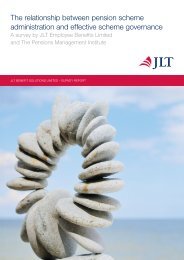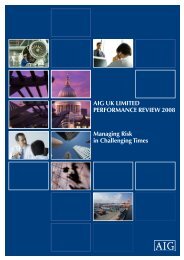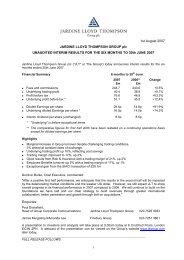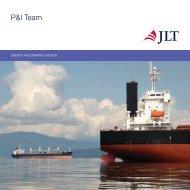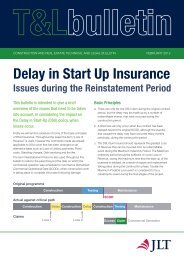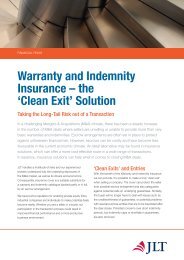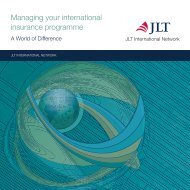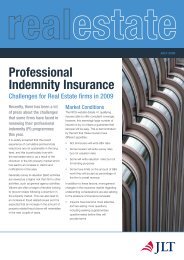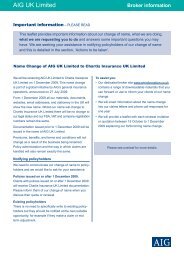Report & Accounts - JLT
Report & Accounts - JLT
Report & Accounts - JLT
- No tags were found...
You also want an ePaper? Increase the reach of your titles
YUMPU automatically turns print PDFs into web optimized ePapers that Google loves.
Financial StatementsAccounting PoliciesBasis of preparationThe Group consolidated financial statements have been prepared under the historical cost convention as modified by therevaluation of available-for-sale investments and derivative financial instruments and using accounting policies and presentation,which comply with International Financial <strong>Report</strong>ing Standards (IFRS) as required by IAS 1.Accounting policies and first time adoption of IFRSThe financial reporting requirements for listed groups have changed since the publication of the Group’s last annual accounts, forthe year ended 31st December 2004. The change is due to the European Commission (EC) regulation that all listed groups publishtheir consolidated results under IFRS, issued by the International Accounting Standards Board (IASB) but as adopted by companiesin the European Union (EU).50The accounting policies and methods of computation adopted in these statements differ from those disclosed previously in theconsolidated financial statements for the year ended 31st December 2004. The consolidated financial statements for the yearended 31st December 2004 conformed with the applicable UK accounting standards and were prepared under the historical costconvention, as required by the Companies Act 1985.The reconciliation of equity at 1st January 2004 and 31st December 2004 and the profit and loss for the year then ended under theapplicable UK accounting standards, to the equity and profit and loss under IFRS was published in the “Restatement of 2004Interim and Full Year <strong>Accounts</strong>” on 7th July 2005. Notes 34 and 35 on pages 98 to 102 set out the reconciliation of shareholders'funds at 31st December 2004 and profit before tax for the year then ended under the applicable UK accounting standards, to thatunder IFRS.Except as noted below, the adoption of IFRS has not resulted in substantial changes to the Group’s accounting policies for the yearunder review.The adoption of IAS 10, 28, 32, 36, 38, 39, IFRS 2 and 3 resulted in changes to the Group’s accounting policies as follows:The adoption of IAS 10 has eliminated the charge for dividends payable from the Income Statement and only dividends approvedby the Balance Sheet date are taken into account.The adoption of IAS 28 requires the presentation of the Group’s share of results from associates to be stated after tax and minorityinterests. Previously the Group’s share of the associate tax and minority interest charges was included under these headings in theGroup income statement. In addition, the adoption of IAS 28 has resulted in the elimination of the Group’s negative carrying value inits French associate Courcelles Participations.The adoption of IAS 32 and 39 has resulted in available-for-sale financial assets being recognised at a fair value and the inclusion ofthe fair values in respect of derivative financial instruments.Jardine Lloyd Thompson Group plc Annual <strong>Report</strong> & <strong>Accounts</strong> 2005The adoption of IFRS 2 has resulted in a change of accounting policy for share-based payments. Until 31st December 2004, theprovision of Executive Share Option Schemes and Sharesave Schemes to employees did not result in a charge to the incomestatement. Adoption of the standard required a retrospective application for all equity instruments granted after 7th November 2002and not vested by 1st January 2004. The accounting charge in respect of Restricted Share Schemes operated by the Group wasunaffected by the adoption of IFRS 2.The adoption of IFRS 3, IAS 36 and IAS 38 resulted in a change in the accounting policy for goodwill. Until 31st December 2004,goodwill was:• amortised on a straight line basis over its expected economic life, subject to a maximum of 20 years; and• assessed for an indication of impairment at each balance sheet date.In accordance with the provisions of IFRS 3:• the Group ceased amortisation of goodwill from 1st January 2004.• accumulated amortisation as at 31st December 2003 has been transferred to “cost” with the effect that the “cost” of goodwillat 1st January 2004 is restated on a net basis.• from the 1st January 2004, goodwill is tested annually for impairment, as well as when there are indications of impairment.



